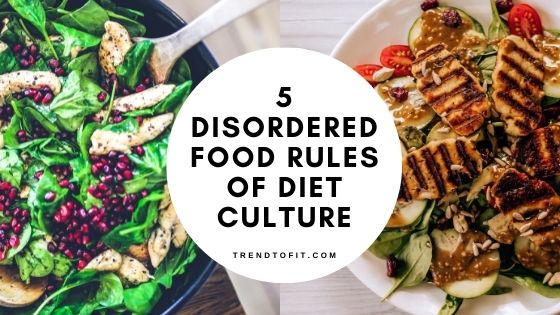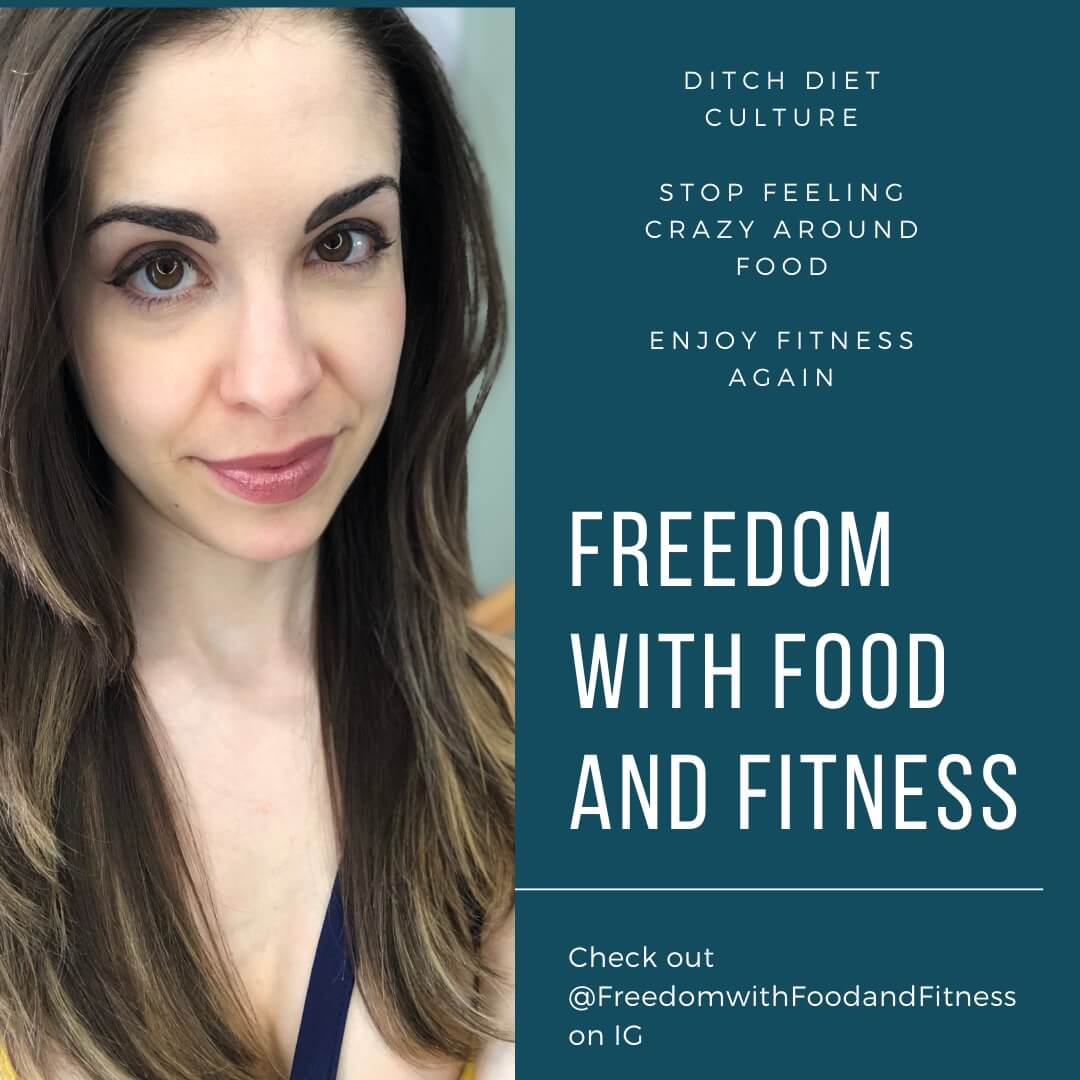Last updated on March 30th, 2023
When we were babies, eating was simple and there were no disordered food rules. We were presented with a variety of options by our caretakers, we would eat what we wanted, in the amount that we wanted, and we naturally became disinterested in food and eating when we were full.
So, what went wrong?
Simply put; Diet culture!
The Toxic Nature of Diet Culture
Diet culture is the collective mindset, created by society, that values thinness, external appearance, and shape above health and wellness. It is pervasive in our overall American culture and even cultures abroad.
Our magazine stands have headlines that encourage us to lose those five pounds (again), use a particular diet to jumpstart our metabolism and try a booty burner workout to melt away the fat.
Social media is no better, and in fact, has only exacerbated the problem. We now have content curated for us that shows us only one certain type of body, the body commonly accepted as ideal: thin, smooth skin, no cellulite or stretch marks, and just the right amount of muscle tone.
There are even filter apps now for photos and videos that can artificially create that “perfect” image. All we see, then, are these airbrushed photos on our feeds. And although we can objectively understand that these are not true realities.
There’s a voice in our heads, one that has always felt we weren’t enough. That feels like there must be a way if only we were strong enough to stick to whatever that “way” was.
How Diet Culture Leads to Disordered Food Rules & Eating Disorders
As a result, pervasive dieting and the quest for this unattainable image have led to disordered food rules and eating habits. These have become commonly accepted as normal and even expected in our culture today.
According to the US National Library of Medicine National Institutes of Health, 50% of teenage girls have tried a diet, and according to the Centers for Disease Control, almost 50% of women have tried dieting to lose weight in the last 12 months.
Because it seems most people are currently on a diet or have tried a diet. The disordered food rules and habits that diets encourage have become second nature to most of us.
I know there will be resistance to challenging these five common disordered food rules and thoughts surrounding eating; for many of us, it’s all we’ve known.
We’ve watched our mothers, sisters, friends, and even ourselves perform these behaviours for years because we believe they are what is expected of us, or how we will receive love, praise, and validation.
But it’s time to reveal diet culture and these behaviours for what they are: harmful and disordered.
1. Counting calories, macros or containers
Too much counting or restricting your food is considered disordered. It goes against our natural body’s cues of hunger and fullness.
Many who struggle with weight and body image see their own body’s hunger as a betrayal of their weight and aesthetic goals.
But really, it’s just our biological cue for more energy!
The only reason we feel like we can’t be trusted around food anymore is that we’ve been trying to restrict it for so long. We restrict ourselves because, usually, we’re trying to achieve a weight that was not meant for our particular bodies.
It’s a hard pill to swallow
But genetics largely dictate our natural weight range. We’re not all meant to be a certain weight for a certain height, despite what the body mass index (BMI) chart tells us.
If we just trusted that our bodies knew how much to eat, they would naturally settle at the weight they were meant to be. And we could stop fighting for our bodies to be smaller.
That’s an exhausting battle to keep up with for our entire lives. At first, yes, we might feel out of control around food and that we’ll never stop eating or gaining weight.
But eventually, your body learns to trust you again, and you, it.
2. Cutting out food groups
Just as trying to control how much you eat is disordered behaviour diet culture has convinced us is normal. Trying to control what you eat through restriction is also not normal.
Yes, we understand that chocolate cake and kale salad have different nutrition profiles. But denying yourself a chocolate cake, if it’s your favourite food, for the rest of your life because you want to reach a number on the scale is not only unreasonable.
It’s not sustainable
Eventually, you will be in the room with chocolate cake, and you will binge on it because you’ve denied yourself it for so long. Or, alternatively, you will still resist the siren song of the chocolate cake.
But be so consumed with thoughts of it, that you will not be present with those around you, probably friends and family.
Instead of making memories with them, you will be thinking about the very food that is okay and normal (and even encouraged!) for you to eat.
Life is short; have the cake.
Suggested:
- 11 High-Protein Breakfast for Indians
- 12 Plan-Based Food Proteins That Are Vegan
- 7 Natural Sweeteners for Indians
- Best Air Fryer in India to Prepare Healthy snacks
3. Not eating after 7 p.m.
(Read the note at the end of the article before you come to any conclusion)
This disordered food rule comes from the science surrounding metabolism. I can speak from personal experience; that I cannot sleep when I am the least bit hungry.
All I can think about is my growling stomach and the anxiety surrounding the fact that I cannot fall asleep. This leads to poor sleep, something much more important to overall health. And me waking up at 1 a.m. to eat that food anyway.
If I’m hungry 15 minutes before bed, I’ll eat.
Guess what?
It’s never made a difference compared to when I would deny myself after 7 p.m. and constantly think about food until bedtime if I was still hungry; at the height of my eating disorder.
I would go to bed earlier than I would want to because I didn’t want to end up getting hungry and eating more food. Having a diet and food dictate when your day ends is not normal behaviour.
You might like:
4. Avoiding fats and carbs
This one is the saddest to me. I did this to myself for years. And yes I lost a few pounds. But I was miserable and constantly thinking about food.
I had no energy and slogged through my days like I was walking through quicksand. I couldn’t think clearly because my brain was living in a fog of my own low-carb and low-fat creation.
We need fats in our diet to keep ourselves sufficiently full and for brain health. We need carbs for sustained energy throughout the day.
Diet culture in the ‘80s and ‘90s
told us these things were what caused weight gain. When I was seeking to lose weight and I cut these macronutrients out too much.
My body actually held on to fat and calories, thinking I was in a famine state. The body can’t tell the difference between starvation and famine…and a diet.
If your goal is weight loss, you are actually being counterintuitive by restricting these crucial food groups that are necessary for a well-rounded food lifestyle.
Also read:
5. Attributing morality to food
This is perhaps the hardest one to break because we are taught this from when we are toddlers. We are praised for finishing our broccoli because it’s “healthy” and “good” and is denied brownies for breakfast because they’re “unhealthy” and “bad.”
As we grow up, we see food labels created by market experts who tell us the cookies are “delightfully sinful” as if there’s morality attached to them.
No foods are good or bad, healthy or unhealthy. Yes, again, they have different nutrition profiles, but that doesn’t make them good or bad.
Birthday cake is bad because it has higher calories, fat and sugar. What about the fact it’s used as a symbol of celebration of life? Or that it tastes yummy?
Also read:
- 15 Best Ways to Make Your Bones Stronger
- Tips to Boost Your Immune System Naturally
- 10 Disturbing Fast Food Facts Causing Health problems
- 5 Types of Foods Avoid in The Morning (And Alternatives)
Conclusion: Disordered Food Rules
These are just a few of diet culture’s sneaky and disordered food rules that we just accept as normal. And what’s worse is, we accept the ideal, to follow.
We need to start challenging these food rules and why we follow them. As I tell my followers, it’s not really about food and weight. We are seeking something greater that, more often than not, is something we need to find within ourselves, not outside of ourselves.
What I teach is how to follow intuitive eating, a philosophy that predicates itself on ditching the diet mentality and trusting your body.
You eat when you’re hungry, you stop when you’re full, and consistently check in with your body to see what it wants, how much, when, and how your body will feel after you’ve eaten it.
There’s no guilt or morality attached to food or weight. Eating becomes very much like peeing: you do it when you have to and then move on with your day.
Those who follow intuitive eating still enjoy food–especially the social, cultural and celebratory aspects of it–but the act of eating doesn’t become an all-consuming brain exercise.
Note:
We at TrendToFit don’t completely agree with what the author has said about not eating after 7 p.m. I myself strongly believe in an age-old science, Ayurveda and have always been promoting Ayurveda on our website.
Ayurveda suggests not having a heavy meal after 7. p.m. because after sunset our digestive fire becomes very slow. But, as we live a modern lifestyle, having your dinner before 7 p.m. isn’t possible in this hectic life at all.
So what’s the solution?
Well, Ayurveda has given the solution too. You can follow some Ayurvedic tips also mentioned by FitTuber.
- Sit in Vajrasana (telling it from personal experience). It helps digest food easily.
- Take ginger with Himalayan salt before having your dinner.
- Sleep on the left side at night.
- Walk for 15 minutes before you sleep.
Author Bio
Alana Van Der Sluys is the founder and CEO of Freedom with Food and Fitness (on Instagram @FreedomwithFoodandFitness), where she supports women who want to ditch diet culture, and find food freedom through intuitive eating, accept (and maybe even love) their bodies, and reclaim joy in fitness. She is currently writing a book that will include strategies, actionable steps, and her own story to freedom from disordered behaviours, including orthorexia, binge-restrict cycles, and body dysmorphic disorder. She’s also a full-time English and journalism teacher, boy mom to one, a lover of wine and whisky, and an avid reader of all genres.
DISCLAIMER: All suggestions mentioned above are based on either research or on the author’s personal opinion. The content in this article is meant for spreading awareness and is not intended as a substitute for professional medical advice or treatment. It’s always better to seek the advice of your physician, nutritionist or another qualified healthcare provider with any question you may have regarding health advice.


Best article for food and told some important things about food and diet thanks for your information. and food is very important to humans.